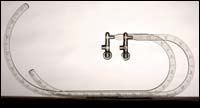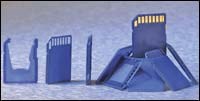Make Polycarbonate Flow Easily Without Losing Toughness or Clarity
Here’s a whole new way to boost the flow of polycarbonate without the drawbacks of other flow modifiers.
Here’s a whole new way to boost the flow of polycarbonate without the drawbacks of other flow modifiers. The secret is a low-molecular-weight cyclic oligomer form of PBT polyester that literally “flows like water” in molten form. This is a brand-new use of CBT (cyclic PBT) resin from Cyclics Corp., owner of patented resin technology originally developed by General Electric. Normally, CBT is used on its own for injection molding with a catalyst that causes the relatively short-chain CBT molecules to link up inside the mold, forming typical high-molecular-weight PBT engineering thermoplastic.
The idea of using CBT without catalyst as a flow modifier for other resins has been commercialized first in Korea by compounder and distributor PolymersNet Co. Ltd. of Seoul. It has a customer injection molding parts for a portable digital memory card only 0.2 mm thick. The molder is using a melt blend of CBT and PC in place of the previous high-heat ABS.
As shown in the accompanying table, only 3% to 5% of CBT increases the melt flow of PC by 30% to 50% or more—even with 40% glass—while maintaining good mechanical properties as well as clarity. Stiffness and heat resistance are slightly reduced. According to sources at Cyclics and a major PC resin producer, other flow-enhancing additives tried with PC severely compromise its impact strength. In the case of one PC resin tested by Polymers Net, addition of 3% CBT 100 resin boosted MFR from 27 to 40.5 g/10 min while notched Izod impact strength went from 77 to 73 kgf-cm/cm2 and tensile and flexural strengths, modulus, and elongation were similarly unaffected.
Just add pellets
The CBT is mixed with PC by compounding in an extruder before molding or by feeding “salt-and-pepper” blends of PC and CBT pellets directly into the molding machine hopper. CBT melts at a moderate temperature—175-180 C or 345-355 F. Adding CBT reportedly also improves dispersion of reinforcements, pigments, and other additives.
Cyclics is working with PC manufacturers, compounders, and molders on other applications, such as cell-phone parts. The company reports early signs that CBT improves flow in acetal, PET, and nylons.
CBT AS A FLOW MODIFIER FOR POLYCARBONATE | |||||
| High-Flow PC | 40% Glass-Filled PC | |||
| CBT 100 Modifier, % | 0 | 3 | 0 | 3 | 5 |
| Tensile Yield Strength, MPa | 59.9 | 61.5 | 95 | 98 | 104.8 |
| Tensile Modulus, GPa | 2.19 | 2.1 | 11 | 11 | 12 |
| Elongation, % | 72.9 | 81 | 3.1 | 2.6 | 2.8 |
| Flexural Strength, MPa | 92 | 95 | 200.6 | 176.5 | 173.5 |
| Flexural Modulus, GPa | 2.56 | 2.55 | 11.6 | 10.8 | 10.7 |
| HDT, C @266 psi | 130.9 | 116.8 | 142.2 | 132.6 | 125.9 |
| Dart Impact, J | 65.3 | 62.2 | 8.2 | 7.7 | 8 |
| Haze, % | 2.8 | 3.57 | — | — | — |
| Light Transmission, % | 87.5 | 88 | — | — | — |
| Yellowness Index | 2.92 | 3.46 | — | — | — |
| MFR, g/10 min | 21 | 29.6 | 13.7 | 23.8 | 27 |
| Spiral Flow, in. % Increase | 19.6 — | 34.3 37 | 20 — | 27.3 37 | 30.2 51 |
Related Content
-
At NPE2024, Follow These Megatrends in Materials and Additives
Offerings range from recycled, biobased, biodegradable and monomaterial structures that enhance recyclability to additives that are more efficient, sustainable and safer to use.
-
Graphene Masterbatches for Flexible and Rigid Polyolefin Packaging and Beyond
Brazilian start-up Gerdau Graphene joins a growing group of graphene additives suppliers with a focus on boosting properties of large volume commodity thermoplastics.
-
PFAS-Free Processing Aid for Blown Film Extrusion
Ampacet’s new processing aid said to perform as well as fluoro-based PPAs in blown film.


















